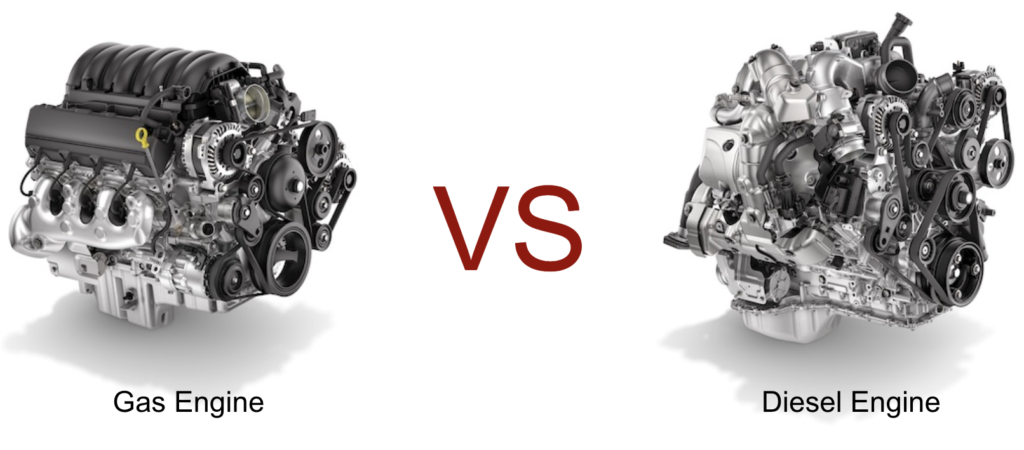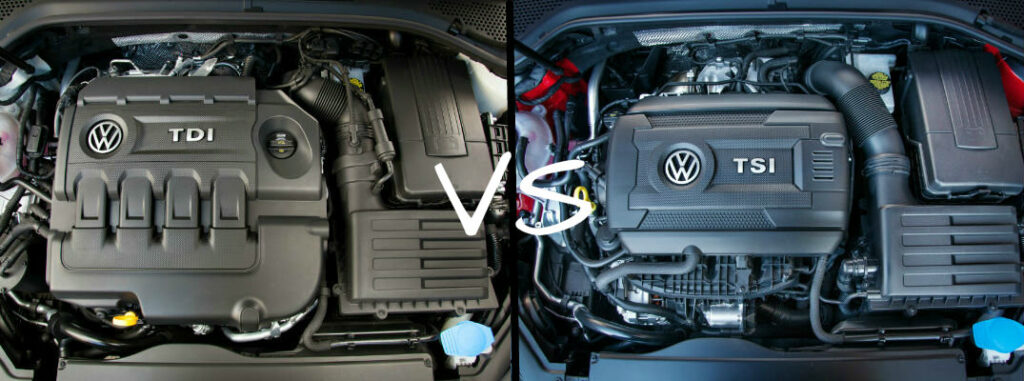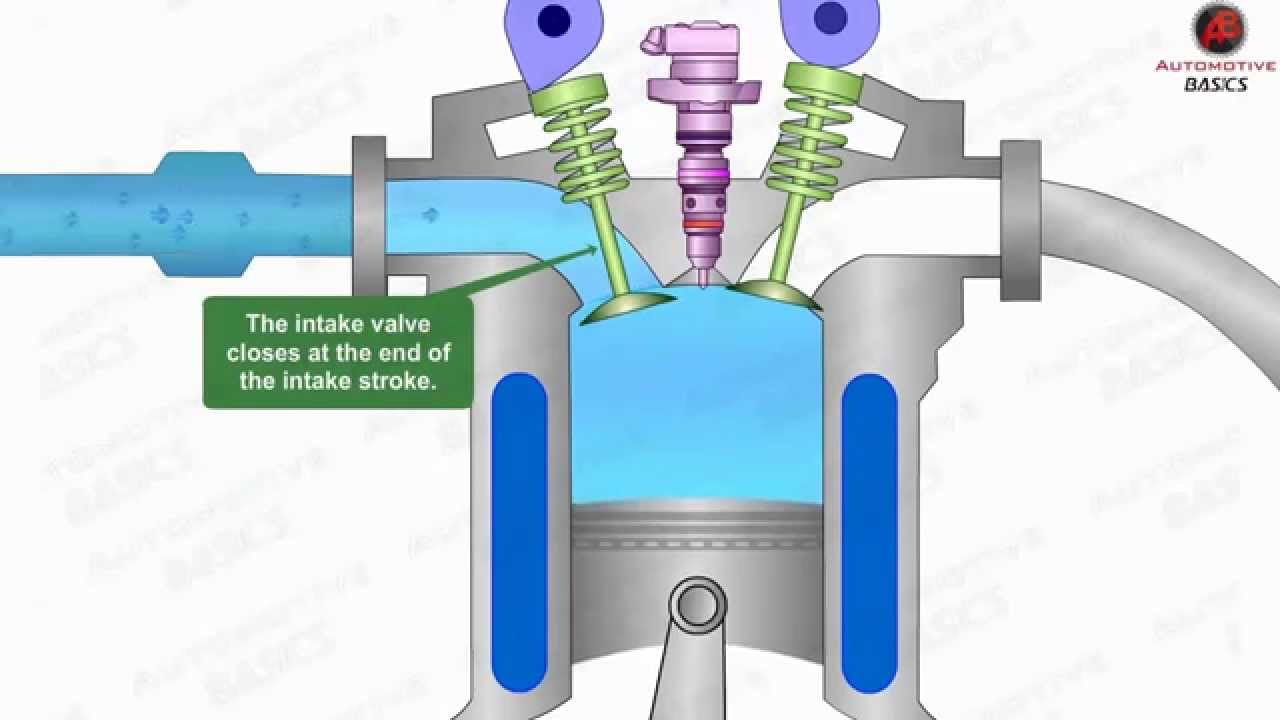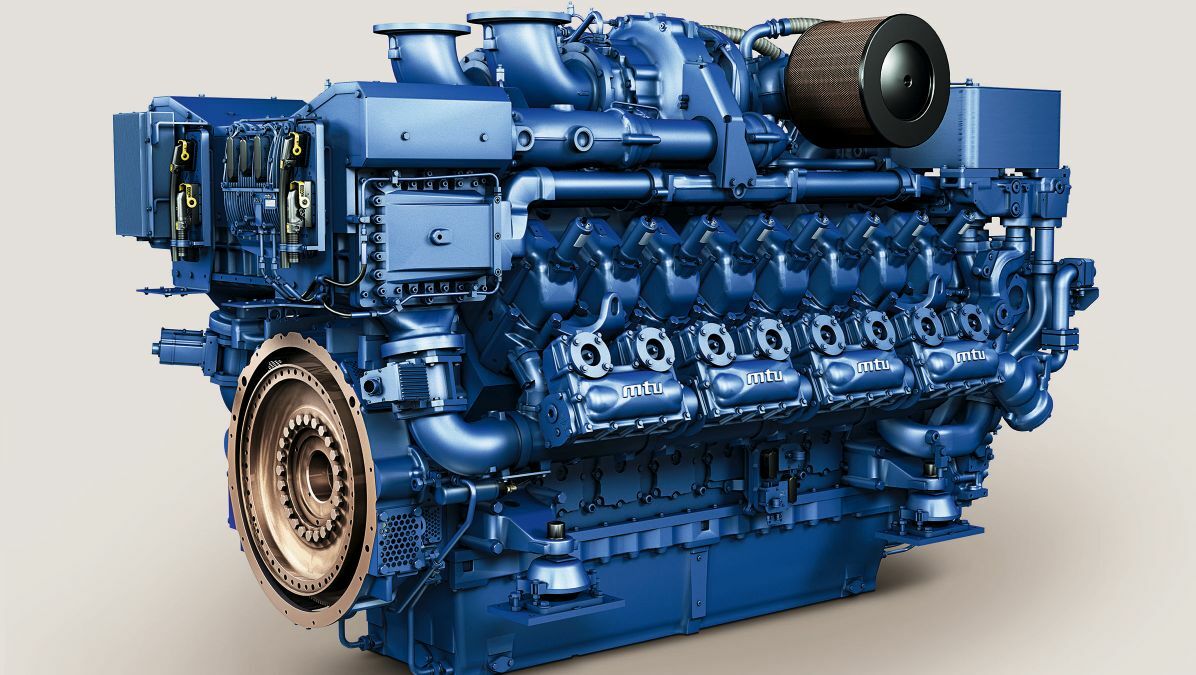Gas and diesel engines transform chemical energy into mechanical energy. But, have you ever wondered what makes the difference between diesel engine and gas engine? You might be curious about it. So, follow us in Linquip to find out the most important difference between diesel engine and gas engine.

First: How Do Gas and Diesel Engines Work?
Diesel engines have the same four-stroke cycle as a gas engine, with one main difference. Here the difference between diesel engine and gas engine is that in diesel engine, air enters the cylinder by itself at the intake stroke. As the piston goes back up and compresses the air, it gets warmer. The fuel is then pumped into the cylinder at the top of this stroke. The heat of the compressed air is sufficient to cause ignition, pulling the piston back down.
Second: Are diesel engines and gas engines similar to each other?
On the surface level, diesel and gas engines seem to be the same. Internal combustion is used both to drive pistons up and down inside cylinders. Both engines generate energy by igniting gas, but the ignition mechanism differs significantly between them. Besides, gas and diesel engines have inherent differences in operation, cost, efficiency, and several more. Let’s dig in diesel engine and gas engine and see how a diesel one outperforms its gas equivalent.
What is the difference between diesel engine and gas engine?
To mention the first one, the difference between diesel engine and gas engine is in terms of fuel economy. Diesel engines are engineered to produce higher pressures during the compression stroke, resulting in higher efficiencies. However, for gas engines, though, the self-ignition temperature must never be hit before the spark plug ignites; as a result, cylinder compression must be reduced, resulting in lower total efficiencies.
In terms of engine operation, the difference between diesel engine and gas engine is in the manner in which these blasts occur. Fuel is mixed with air compressed by pistons in a gas engine. To drive the engine, the spark plugs ignite this mixture. In a diesel engine, on the other hand, the air is compressed first. The weather becomes sticky as a result of this. When the gas comes into contact with the hot air, it ignites.
The difference between diesel engine and gas engine, the second one, is that diesel engine has a greater compression ratio than gas engine. There is no ignition in a diesel engine. It’s a compression combustion engine. The instability points of gas engines, on the other hand, are much higher, but the flashpoint is much smaller. A spark controls the ignition of a gas engine. The gas is compressed with fresh air, and as the piston reaches the end of its stroke and the compression is at the desired level, a spark ignites the fuel and air mixture causes the engine to start.
It’s important to mention that higher compression ratios in a diesel engine will produce amazing results in terms of power. Diesel engines depend on higher temperatures and higher compression ratios to combust the fuel. Greater compression not only leads to more power available for mechanical operation but also translates into more fuel efficiency.
Furthermore, diesel fuel has a higher volume of stored energy per gallon. When these two aspects are combined, diesel engines can achieve the higher mileage that they are popular for when compared to comparable gas ones.
A diesel engine is more durable and can last about twice as long as a gas engine in terms of life expectancy. The essence of the fuel is one of the reasons for this.
The difference between diesel engine and gas engine is also that diesel engine is with stable operation and low maintenance requirements. Diesel engines often have fewer components than gas engines, reducing the number of possible parts that might fail in the vehicle. They often need fewer repair and maintenance facilities than gas engines, resulting in cost savings.
Though early diesel engines had a well-deserved reputation for being loud, recent technology has largely addressed this problem. Noise emissions and dark smoke have been reduced; and today, the driving environment of a diesel vehicle is virtually equal to that of a gas vehicle.
The thermal performance of diesel engines is another most significant difference between diesel engine and gas engine. The thermal efficiency of a diesel engine is about 20% higher than that of a gas engine, which is a 20% improvement in fuel economy.
The difference between diesel engine and gas engine also lie in terms of high torque application of a diesel engine which is very useful for hauling, as it aids in handling heavy loads. Diesel engines provide a lot of torque at low rpm, which is ideal for towing. When fully loaded, they get higher fuel mileage and last longer. The integrated exhaust brake is another good feature of most diesel engines. Diesel engines have more torque but less horsepower than gas engines. This is why gas engines are used in sports cars and diesel engines are common in large vehicles. When hauling a heavy payload, the diesel engine’s power and exhaust brake would still be useful, but if the truck is being driven to its limits, the lighter weight of the gas engine would make for a higher payload.
Considering the factor of fuel injection, the difference between diesel engine and gas engine is that fuel is injected differently in gas and diesel engines. A port injection system (a carburetor) may be used to pump fuel into a gasoline engine. Right before the intake stroke, the port injection mechanism injects air into the fuel. A carburetor, on the other hand, combines the fuel and air before sending it into the cylinder to compress. Fuel is pumped directly into the cylinder of a diesel engine. Since diesel injectors are such an important part of how diesel engines operate, they can become a complicated part of the operation. The injectors must be able to endure high temperatures and a lot of pressure to produce the fine mist of fuel needed for the process to operate. Engine control modules and glow plugs are examples of engine developments. A glow plug is a hot wire that can quickly increase the air temperature in a cold engine to make it start more efficiently. Engine control modules use multiple sensors to accurately timing the injection, and a glow plug is a hot wire that can quickly raise the air temperature in a cold engine to help it start more efficiently.
Maintenance is the other factor to consider for the difference between diesel engine and gas engine. Maintenance on a diesel engine is usually more expensive than maintenance on a gas engine. Diesel retains more gas, making oil changes more costly. There are a variety of filters and parts that need to be changed between the gas and exhaust systems that you won’t see on a gas engine. Diesel exhaust fluid, which must be applied to satisfy emissions standards, is also used for new diesel engines. The lower RPM of diesel engines reduces fatigue on certain engine parts. When the diesel is run hard for long periods, it will compensate for the increased cost of service. Under these conditions, gas engines are more likely than diesel engines to experience expensive internal defects.
The last difference between diesel engine and gas engine is that Diesel is typically the safer option for customers who would be driving their car or truck mostly on highways. A diesel vehicle is more fuel-efficient on the highway than gasoline engines. This is since diesel fuel has higher energy than gas.
Final Word
Now you’ve learned about the difference between diesel engine and gas engine, you should be able to make a more informed decision about which one can be best for you. But if you want to learn more, feel free to leave your comments in Linquip. Our experts are fully ready to provide you quality answers.
Buy Equipment or Ask for a Service
By using Linquip RFQ Service, you can expect to receive quotations from various suppliers across multiple industries and regions.
Click Here to Request a Quotation From Suppliers and Service Providers
Read More On Linquip
- The Difference Between Diesel Engine and Petrol Engine: which one best work for you?
- Gas Engine Services
- Industrial Gas Engine Services
- Industrial Gas Engine Installation Services
- Industrial Gas Engine Maintenance Services
- Industrial Gas Engine Services in Texas
- Industrial Gas Engine Installation Services in Texas
- Industrial Gas Engine Maintenance Services in Texas






